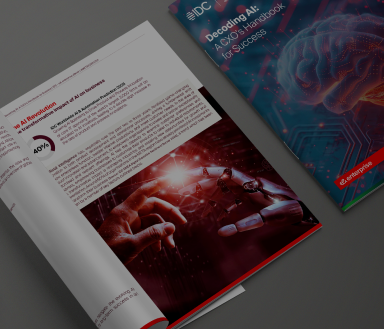Optimising Data Centre Efficiency: Leveraging (AI) and Automation for Business Growth
10 june, 2025
In the evolving landscape of data centre management, the rapid development in various fields of technology - and its impact on the global economy growth – is placing significant pressure on data centres worldwide. As the pace of digital transformation continues to accelerate, it fuels an increasing demand for data centres, resulting in heightened energy consumption, carbon emissions, and water usage. Data centres are the backbone of modern business operations, powering services and systems from cloud computing, IoT, ecommerce, AI-driven applications and many other critical infrastructure systems. However, the growth of data and rising demand for computing power are two of the main factors intensifying the pressure on data centres to operate efficiently and sustainably. Take Dubai as an example: one of the key priorities in its D33 Economic Agenda is to “increase economic productivity by 50% through innovation and digital adoption”. In this context, optimising data centre efficiency is no longer just a technical concern - it has become a strategic imperative for data centre providers seeking to reduce costs, enhance performance, and minimise their environmental footprint. Leveraging artificial intelligence (AI) and automation is emerging as a powerful solution to address these challenges and drive sustainable business growth.
The Increasing Demand for Data Centre Efficiency
Among all types of facilities worldwide, data centres rank as some of the most power intensive. According to the International Energy Agency. data centres consume between 2% and 3% of the world's electricity. In 2023 alone, this infrastructure consumed around 350 TWh.
The UAE’s data centre market is expected to experience significant growth, driven by various government initiatives as D33 Economic Agenda and the UAE’s Artificial Intelligence Strategy 2031. The strategy outlines the vision: “WE WILL TRANSFORM THE UAE INTO A WORLD LEADER IN AI BY INVESTING IN PEOPLE AND INDUSTRIES THAT ARE KEY TO OUR SUCCESS”. This emphasis on AI integration spans multiple sectors, including data centres.
However, this expansion comes with its own set of challenges.
Current Trends and Challenges in Data Centre
The data centre industry is witnessing several key trends, including:
- Increased Data Volume: The explosion of IoT devices, streaming services, and AI applications is generating huge volume of data, requiring larger and more powerful data centres.
- Sustainability Concerns: Data centres consume vast amounts of energy, contributing to carbon emissions and raising concerns about their environmental impact.
- Hybrid Cloud Adoption: More businesses are increasingly adopting hybrid cloud strategies, combining on-premises data centres with cloud services. This trend leads to increasing complex infrastructure management.
These trends also present several challenges, such as:
- Energy Consumption: Cooling systems and servers account for a significant portion of data centre energy use. Optimising energy efficiency is crucial to reducing both operational costs and environmental impact.
- Infrastructure Management: Managing complex data centre infrastructure – such as servers, networks, and storage - requires significant human effort and can be prone to errors.
- Predictive Maintenance: Preventing equipment failures and downtime is essential for ensuring business continuity. Traditional maintenance practices are reactive, often leading to unplanned outages.
- Data and Integration Barriers: Effective AI implementation requires access to high-quality data and seamless integration with existing (often legacy) systems.
- Cybersecurity and Privacy: The deployment of automation and AI must be coupled with strong safeguards to prevent data breaches and maintain trust.
AI and Automation as Key Enablers for Data Centre Efficiency
The growing demand for AI is putting additional pressure on data centres infrastructure design, particularly in terms of power and cooling. As a result, AI and automation are no longer optional; they are essential for next-generation data centre operations.
Data centre managers increasingly prioritise energy performance with power consumption identified as a key metric for reporting. AI helps address this challenge by enabling predictive maintenance, reducing equipment downtime. For instance, AI systems monitor temperature, airflow, and hardware health, anticipating failures and extend the lifespan of critical equipment.
AI-driven optimisation leverages machine learning (ML) algorithms to analyse real-time data, predict demand, and dynamically adjust resources:
- Google’s DeepMind JEST AI tool reduced energy consumption in its data centres by optimising cooling systems.
- Microsoft has made strides in sustainable design, with its next-generation data centres now utilising zero-water cooling systems. This innovative solution helps reduce the environmental impact of their operations, reflecting the broader industry shift towards more sustainable practices.
- OpenAI, in collaboration with Oracle and SoftBank, is investing in the Stargate initiative, a $500 billion project to establish advanced AI data centres globally. This ambitious initiative aims to enhance AI infrastructure capabilities and maintain a competitive edge in the AI domain.
Additionally, AI enhances resource allocation. By analysing workload patterns, AI dynamically balances computational loads across servers, minimising energy waste.
Implementing AI and Automation: Considerations and Best Practices
While AI and automation offer enormous potential, successful implementation requires careful planning and execution. Key areas of focus include:
- Data Collection and Analysis: Accurate and high-quality data collection is essential for training AI models and optimising performance.
- Seamless Integration: AI and automation tools must be integrated seamlessly with existing data centre infrastructure.
- Security and Compliance: Strong cybersecurity protocols must be implemented to protect sensitive data and comply with privacy regulations.
- Workforce Skills: Teams must be upskilled to operate, manage, and interpret AI systems effectively.
- Phased Rollout: Implementing AI and automation in phases allows for testing and refinement before full-scale deployment.
Looking Ahead: Future Trends in Data Centres
The evolution of data centres does not stop at AI and automation. Forward-looking organisations are already exploring:
- Quantum Computing: Offering exponential increases in processing power, quantum systems could reshape the core of data centre architectures in the coming decades.
- Edge Computing: As demand for low-latency processing grows, decentralised mini data centres located closer to the end-user are expected to become more prominent.
These innovations, coupled with AI, will further transform data centre operations—making them faster, greener, and smarter.
Conclusion: A Strategic Imperative for Data Centre Efficiency
AI and automation are no longer emerging technologies—they’re here, and they’re reshaping the future of data centres. By leveraging AI-powered energy management, automated infrastructure management, predictive maintenance, and resource optimisation, data centre service providers can reduce operational costs, boost performance, advance sustainability, and drive business growth. With the UAE’s ambitious agendas – such as the National AI Strategy 2031 and the Dubai Clean Energy Strategy 2050 – alongside industry leaders, and global regulators supporting digital transformation and climate action, the time to act is now.
To remain competitive and compliant in the digital era, data centre providers must embrace AI and automation—not as a trend, but as a strategic priority.
Ready to future-proof your data centre? Talk to our experts about how AI and automation can transform your operations
Explore More About AI and Digital Transformation

How AI Is Reshaping The Middle East’s Future

Decoding AI: A CXO's Handbook for Success

AI-as-a-Catalyst for Digital Transformation
Let's work together
Embrace change as our digital transformation industry experts & innovation across Cloud & Edge help you build a better tomorrow.
